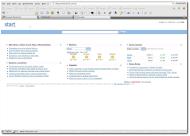
 ave you ever pondered or worried about what search engines know about you? If not, you should. It is no secret that even the most prominent and powerful companies see value in tracking their users. Companies do not have any desire to infringe the user’s right for privacy, but information about their users allows them to improve their services, e.g. by behaviour learning which leads to optimisation and targetted content.
ave you ever pondered or worried about what search engines know about you? If not, you should. It is no secret that even the most prominent and powerful companies see value in tracking their users. Companies do not have any desire to infringe the user’s right for privacy, but information about their users allows them to improve their services, e.g. by behaviour learning which leads to optimisation and targetted content.
A few clarifications are worth making: If you use Windows and, more particularly, if you use Internet Explorer, your privacy is jeopardised the most. I am not pointing my finger at Microsoft, but spyware is targetted at the most prolific platform and application. It is the most cost-effective spyware development process. Have you heard about Alexa rating? Ranks are most likely based on spyware at some level or another. The watchers know what sites you visit. The watchers might also know what pages you bookmark, how long you ‘sit’ on a SERP, which pages you follow and the list goes on and on.
Google should be able to infer, based on a small statistical sample that is exposed to spying, which page got bookmarked the most after it was reached from one given SERP (e.g. leaving SERP, then hitting “back” and requesting the SERP again). This way, spamfull sites can be distinguished from sites the user actually had interest in and ended up bookmarking. It is a machine learning approach. Results adapt to users’ behaviour. With a cunning Google cookie that precisely identifies users, you can only imagine the tonage of data that is accumulated about individuals. Shall it be needed, let it be taken ‘off the shelf’…

The Google Cookie
On to Microsoft, they already exploit cookies by swapping them across sites, which of course is questionable if not an illegal practice. They have recently bought a spyware company (Claria who make Bonzi and other related ‘goodies’). Consequently, they downgraded Claria’s threat level, which was a cause for controversy, much like a controversy with Firefox. Users reported that Firfox was labelled harmful by Microsoft’s spyware detection application; Firefox removal was recommended too. All in all, it appears as though MSN have similar plans in mind and aggressive behaviour remains one of their innate features.
Disclaimer: I am not entirely sure about each one of the facts above, but spying is nothing unprecedented. What I argued is based on text (and I do not mean science-fiction or conspiracy theory resources), though many speculations were involved and such communication must be taken with a grain of salt.
 mericans can take advantage of a database/map of nearby Wi-Fi HotSpots. This Web site, WiFiMaps.com, is of course far from ethically acceptable. Perhaps it will force system administrator to finally change the default, out-of-the-box settings on their routers. It is amazing how penetrable Wi-Fi connections have become.
mericans can take advantage of a database/map of nearby Wi-Fi HotSpots. This Web site, WiFiMaps.com, is of course far from ethically acceptable. Perhaps it will force system administrator to finally change the default, out-of-the-box settings on their routers. It is amazing how penetrable Wi-Fi connections have become.





 Filed under:
Filed under: 


 ollowing a recent item on
ollowing a recent item on 


 ave you ever pondered or worried about what search engines know about you? If not, you should. It is no secret that even the most prominent and powerful companies see value in tracking their users. Companies do not have any desire to infringe the user’s right for privacy, but information about their users allows them to improve their services, e.g. by behaviour learning which leads to optimisation and targetted content.
ave you ever pondered or worried about what search engines know about you? If not, you should. It is no secret that even the most prominent and powerful companies see value in tracking their users. Companies do not have any desire to infringe the user’s right for privacy, but information about their users allows them to improve their services, e.g. by behaviour learning which leads to optimisation and targetted content.

 Would you believe that a base unit with a monitor can be sold for as little as $225? Although there is no mentioning of the O/S and software that is included, buyers can get it all for a mere pittance in India. There are some amazing offers in westernised countries as well. In the UK, for example, a Linux box can be as cheap as
Would you believe that a base unit with a monitor can be sold for as little as $225? Although there is no mentioning of the O/S and software that is included, buyers can get it all for a mere pittance in India. There are some amazing offers in westernised countries as well. In the UK, for example, a Linux box can be as cheap as